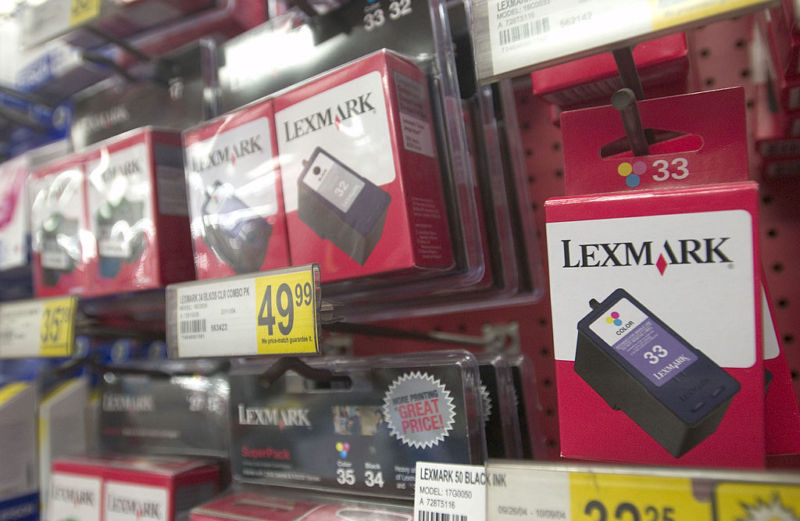
The US Supreme Court voted 7-1 to place more limits on the rights of patent-holders, striking down a decision by the nation's top patent court for the second time in two weeks.
In Impression Products v. Lexmark International, the justices' opinion (PDF) made crystal clear that once a patented item has been sold once, the patent is "exhausted" and can no longer be enforced. That's true even if the sale happened abroad and the item was later imported. Lexmark had two different strategies for trying to control how its cartridges get re-used; the high court struck down both of them and paid scant regard to various industry briefs pleading to maintain the pricing structures used by Lexmark and others to maintain profits.
Lexmark had been trying to use patent laws to impose restrictions on companies like Impression Products, which are known as "remanufacturers." These companies acquire Lexmark cartridges, then re-fill and re-sell them. A strong 10-2 majority of judges on the US Court of Appeals for the Federal Circuit, which hears all patent appeals, took Lexmark's side and found that the patent-related restrictions were justified.
Today's ruling is a win for many tech companies, with companies like Vizio, Dell, Intel, LG Electronics, HTC, and Western Digital all taking the side of Impression Products. Public Knowledge also filed a brief in the petitioner's favor. The companies on Lexmark's side, no surprise, were heavy licensors of patents, including tech giants like Qualcomm, IBM, Nokia, and Dolby. Biotechnology and pharmaceutical groups also supported Lexmark. Those lineups largely mirror industry divisions over Congressional debates around reforming patent laws, with the pro-Impression companies favoring user-friendly changes to patent laws, and the pro-Lexmark companies wanting more changes that favor patent owners.
Exhausted, at home and broad
Lexmark offers US buyers two different ways to buy printer cartridges: pay full price for a regular cartridge or get a 20-percent discount by using a "Return Program" cartridge, which entails agreeing to return the cartridge to Lexmark.
That contractual obligation was reinforced by a technical measure, as well: a microchip that Lexmark installed inside Return Program cartridges prevented them from being reused by anyone other than Lexmark. Those microchips got hacked, though, by third parties who created their own, unauthorized replacement microchips.
Lexmark sued Impression, alleging two different kinds of violations of patent law. First, Impression was accused of buying Return Program cartridges, altering their chips, re-filling them, and re-selling them in the US. Second, Impression bought some Lexmark cartridges abroad and imported them into the US. Lexmark said all the cartridges in that second group infringed its patents, whether they were Return Program cartridges or Regular. The Federal Circuit held that in both cases, Lexmark could go ahead and sue, in part because Impression had full knowledge of exactly the restrictions that were placed on the cartridges.
The Supreme Court reversed on both counts. As to the US sales of Return Program cartridges, "Lexmark exhausted its patent rights in these cartridges the moment it sold them," wrote Chief Justice John Roberts for the majority. "A patentee is free to set the price and negotiate contracts with his purchasers, but may not, 'by virtue of his patent, control the use or disposition' of the product after ownership passes to the purchaser." [Emphasis in original.]
Roberts went on to trace the exhaustion principle through common law going back to the 17th century. "As Lord Coke put it... if an owner restricts the resale or use of an item after selling it, that restriction 'is voide, because... it is against Trade and Traffique, and bargaining and contracting betweene man and man,'" wrote Roberts.
Lexmark is purporting to enter a contract with its customers, which they agree to when they take the Return Program discount. But if that contract is violated, it doesn't follow that Lexmark can go ahead and sue an entirely different party for patent infringement.
Next, the justices held that patent exhaustion holds up even in foreign sales. Roberts pointed to the 2013 Kirtsaeng copyright decision, which allowed a Thai graduate student to import legally purchased foreign textbooks into the US, despite the publisher's allegations that the importation infringed copyright.
"[D]ifferentiating the patent exhaustion and copyright first sale doctrines would make little theoretical or practical sense," writes Roberts. "The two share a "strong similarity... and identity of purpose."
As was the case with Kirtsaeng, the ability to import cheaper goods may affect the profits of an owner of intellectual property. But that doesn't mean a patentee can use the patent laws to enforce its preferred cost structure.
"The patentee may not be able to command the same amount for its products abroad as it does in the United States," Roberts writes. "But the Patent Act does not guarantee a particular price."
The court had already addressed the issue of patent exhaustion in 2008, in Quanta Computer v. LG Electronics. However, that case did not involve sales by the patentee itself (LG) but rather Intel, a manufacturing licensee—and LG made no attempt to restrict Intel's sales. In the Federal Circuit's view, that made the case "at least two steps removed from the present case." But the Supreme Court has now said the same rule applies.
Justice Ruth Ginsburg wrote a dissent in which she argued that the foreign sales should not exhaust an inventor's US patent rights. Ginsburg also dissented from the Kirtsaeng copyright decision, which was the key precedent upholding Impression Products' win on the foreign sales.
reader comments
138